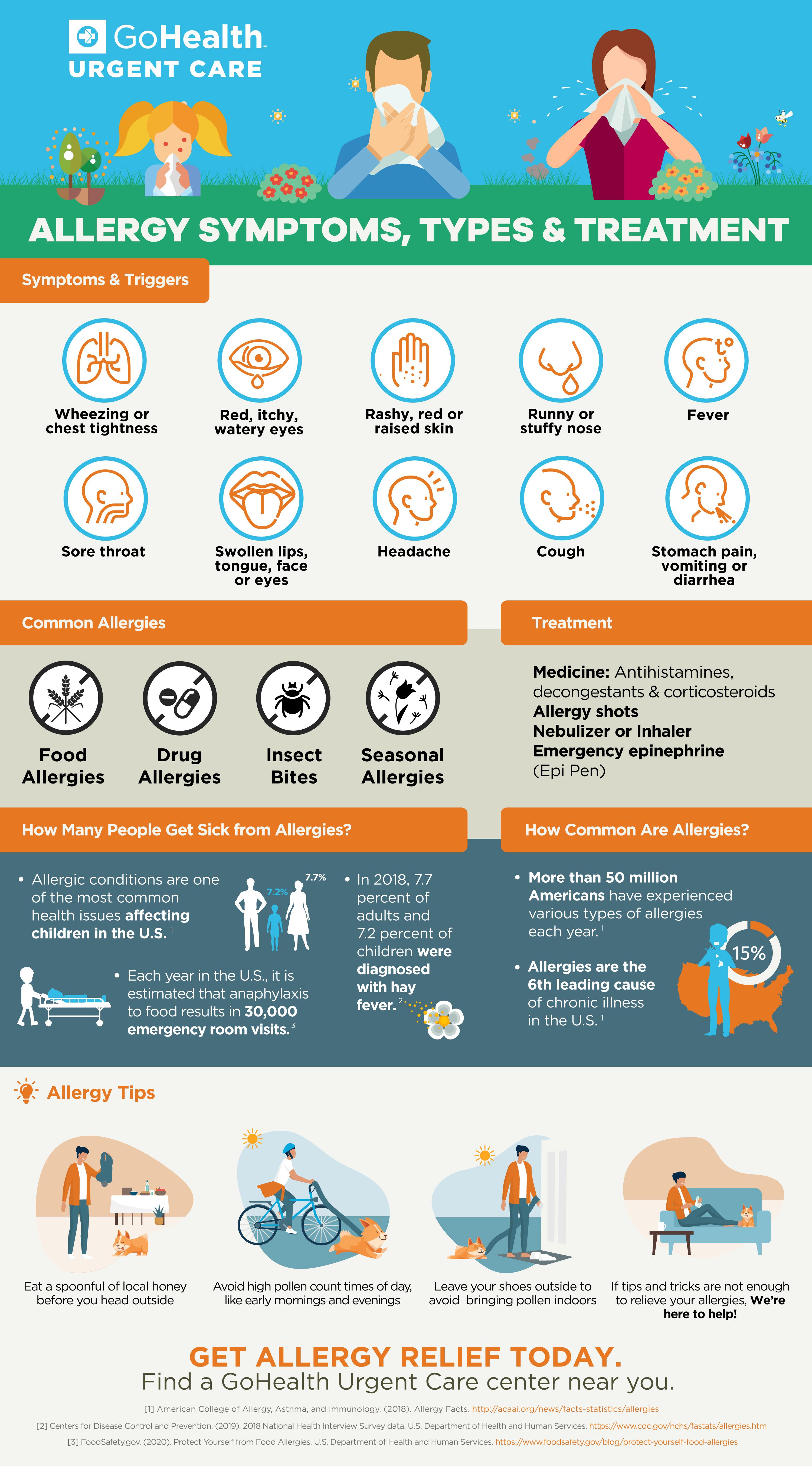Allergy Attacks and Allergic Reactions: Know When To Seek Urgent Care
As the seasons change, combined with other things like pollution and cold & flu season, make it difficult for allergy sufferers. While allergies may cause mildly annoying and bothersome symptoms, some allergic reactions can be life-threatening. It’s important to know the difference, and when to seek urgent care for allergies.

The Allergic Response
The job of a healthy immune system is to recognize foreign substances and summon resources, such as white blood cells, to destroy them. Many substances that enter the body are harmless, and in nonallergic persons, the body would not normally mount a reaction; however, in individuals with allergies, exposure to an allergen causes the immune system to react, sometimes quite violently, which results in a variety of signs and symptoms experienced by the allergic individual. The severity of the reaction will help you determine when to seek urgent care for allergies.
Types of Allergies
People can be allergic to almost anything. The following are some of the most common allergies:
- Many people are allergic to certain foods; some are merely sensitive and do not experience a true immune response. Sensitivity may occur when a person lacks the necessary enzyme to break down a certain protein, as in lactose (dairy) intolerance, which can lead to stomach pain or cramping. In a true food allergy, eating the food will trigger an immune response, leading to allergic symptoms such as swelling of the airway (which can result in difficulty breathing) or rash. Some of the most common food allergies include milk, eggs, wheat, nuts, fish and shellfish, casein (a protein found in milk), soy, and sulfites.
- Although we associate seasonal allergies with springtime, they can occur all year long, especially in the Fall, for some unlucky individuals--those who experience different allergies to different substances depending on the time of year. Pollen is a common seasonal allergen, as is dust, grass, and oak. Allergic rhinitis, often called hay fever, is a reaction to grains and pollen, as well as other substances, and may occur during a certain season (seasonal) or all year long (perennial).
- Many households contain a pet or two, and allergies to cats and dogs are very common. The dander that is released from the animal’s skin (or feathers) is the culprit of pet allergies.
- Fire ants, bees, wasps, and hornets are the most likely stinging insects to cause an allergic reaction. Many people confuse the normal symptoms that occur after being stung with an allergic reaction, but an allergic reaction to an insect sting is often very severe—with symptoms like swelling around the lips, eyes, and tongue; difficulty breathing; itching, cramping, or severe numbness; and dizziness or lack of consciousness—and will require a visit to the nearest health facility.
- Any medication can cause an allergic reaction in a susceptible individual. Many people are allergic to penicillin—this means their bodies react inappropriately to the presence of the antibiotic in their bloodstream and trigger an immune response that can cause symptoms such as dizziness, nausea, difficulty breathing, and hives.
- Many people suffer an allergic reaction after being exposed to certain perfumes, shampoos, detergents, cleaning agents, or creams. It can be very difficult to identify the culprit because we use so many chemicals in our daily lives.
Allergic Signs and Symptoms
Not everyone will respond to the same allergen in the same way. Some allergic reactions are relatively mild and localized, while others are severe and affect many different body systems. The following are examples of how different body systems can be affected:
- redness, itching, swelling, scaling, blistering, weeping, crusting, hives, welts
- a sensation of chest tightness, wheezing, coughing, feeling short of breath
- rapid heart rate, low blood pressure (which can lead to shock in severe reactions), vasodilation
- itching, watering and redness of the eyes, nasal congestion, swelling/soreness of the throat, hoarseness, sneezing, swelling of the area around the eyes
- stomach pain, nausea, vomiting, diarrhea
- anxiety or a sense of impending doom (in anaphylaxis, see below), fatigue
When to Seek Help
Many people wonder when they should seek urgent care for allergies. An urgent care facility can help you identify the cause and deal with the symptoms of allergies that are non-severe and non-life-threatening. However, any time your symptoms are severe and sudden you should seek immediate medical attention from an emergency department, not an urgent care facility—they may be a sign of anaphylaxis. Anaphylaxis is a form of allergic reaction that is rapid, severe, and life-threatening. Symptoms develop almost immediately and, without medical care, the person may die. Anaphylaxis causes difficulty breathing due to swelling of the airways and low blood pressure. Combined, these symptoms can lead to shock. Other symptoms and signs of an allergic reaction may also be present, such as hives, swelling, and gastrointestinal symptoms. The treatment for anaphylaxis is epinephrine, a drug that causes the blood vessels to constrict, thus raising blood pressure. Some people who have experienced a severe allergic reaction carry an Epi-Pen (a syringe that contains a dose of epinephrine) so that they can administer the drug to themselves while waiting for emergency assistance.
If you or your loved one experiences any of the above symptoms of anaphylaxis, don’t wait to see if symptoms improve--go immediately to the nearest emergency department. You should also seek medical care for allergies if you are experiencing a new rash, hives, or other allergy symptoms that are making you uncomfortable, though these symptoms may not be as urgent, and can be addressed by a GoHealth Urgent Care facility near you!